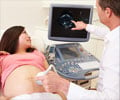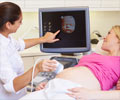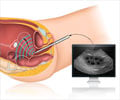The University of South Carolina School of Medicine has been chosen by GE Healthcare as the nation’s first medical school to test an ultrasound device that could revolutionize diagnostic medicine.
The University of South Carolina School of Medicine has been chosen by GE Healthcare as the nation’s first medical school to test an ultrasound device that could revolutionize diagnostic medicine. University of South Carolina medical students are testing GE Healthcare’s LOGIQ E ultrasound equipment as part of a pioneering curriculum that includes the use of ultrasound technology across four years of medical education.
What these future doctors learn – and share with GE Healthcare – could enable a primary care physician to detect a patient’s medical problem sooner.The portable units, about the size of a laptop computer, weigh 10 pounds and are a sharp contrast to the heavy and cumbersome ultrasound machines that weighed about 300 pounds just five years ago.
Dr. Richard Hoppmann, interim dean of the USC School of Medicine, said, “The School of Medicine Class of 2010 is embarking on a truly novel approach in diagnostic medicine. The goal of our curriculum is to expand the use of ultrasound as a diagnostic tool in many areas of medicine, but especially in primary care fields.”
Medical students will learn about the benefits of ultrasound for family and preventive medicine and internal medicine, as well as surgery, obstetrics and gynecology and its uses in emergency medicine.
“The ultrasound curriculum adds an exciting hands-on component with immediate results that show our students the practical applications of technology in medicine," Hoppmann said. "As a result of our enhanced curriculum, we see energy and enthusiasm in the classroom.”
The medical school also has added an ultrasound curriculum for students in their second, third and fourth years of medical education.
Advertisement
Several times during their education, GE Healthcare will provide USC School of Medicine students with newly designed and newly manufactured ultrasound machines.
Advertisement
“Technologies such as ultrasound can be used to help detect diseases earlier, when they can be more effectively treated,” he said. “These pilot studies may provide support for more primary care physicians to utilize miniaturized ultrasound technology to supplement or potentially replace the stethoscope that is used today.”
Dr. Harris Pastides, the university’s vice president of research and health sciences, said the educational partnership with GE Healthcare fulfills the university’s commitment to teaching, research and outreach.
“With GE Healthcare, the University of South Carolina has embarked on a journey to produce improved technology and better courses of study – both of which will lead to better doctors and better healthcare,” he said. “And it wouldn’t be possible without this public-private partnership with GE Healthcare.”
To a certain extent, School of Medicine students are venturing into uncharted territory, he said.
“That is the heart and soul of research. Each new advance broadens our knowledge and enhances the potential for other discoveries,” he said. “The University of South Carolina School of Medicine and GE Healthcare have the opportunity to change the practice of medicine.”
LOGIQ E is an extra tool that gives doctors a look into the patient’s body without invasive procedures, Hoppmann said.
“This technology will give us an extra check for our patients,” he said. “Doctors will be able to diagnose problems sooner or perhaps relieve patients’ fears. These benefits are just around the corner, and I’m proud to say our graduates will have played a key role in improved medical care for people in South Carolina and throughout the world.”
Source-Newswise
SRM











